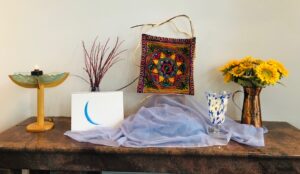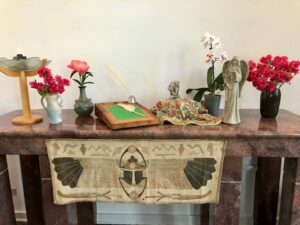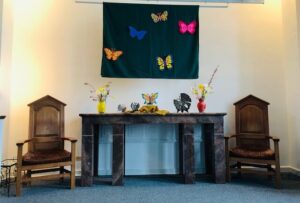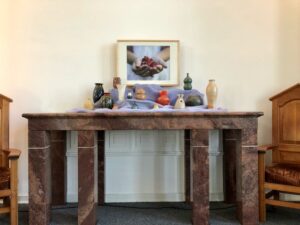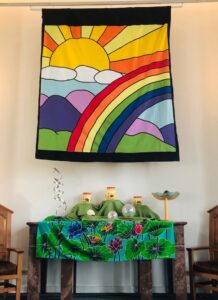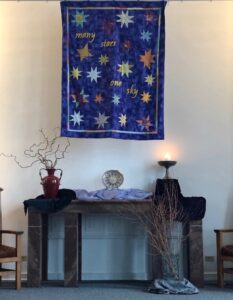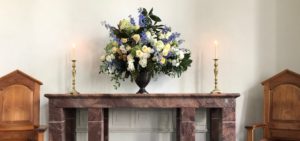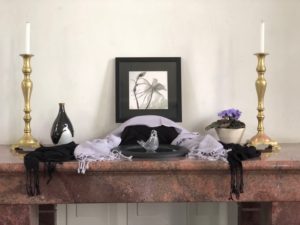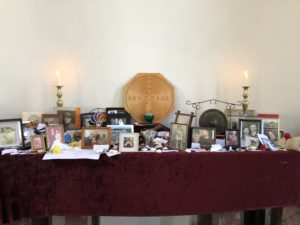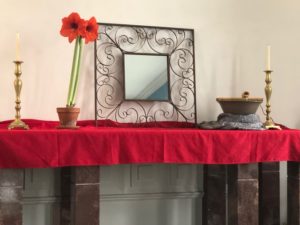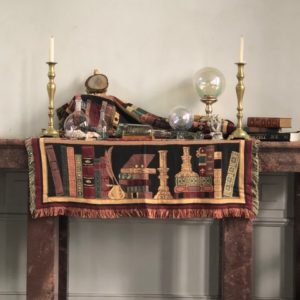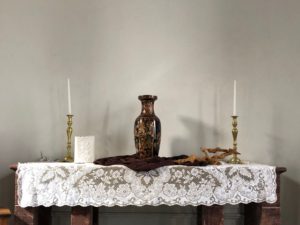“Rural Voices”
Good morning. The sermon topic that was advertised for this morning was about chapters of life and how to live in a spiritually full way at each stage. I realized over the last few days that Erik covered that somewhat last week and I covered it in my April sermon. So, I decided over the last few days to change and speak on another topic, but if any of you were particularly seeking nourishment on that topic, please let me know afterwards and I will find a way to respond to that need.
I have chosen to use the pulpit and my voice this morning to speak about an issue that is current and under great discussion. Local and national news reported that this week a request was filed at the Charlottesville City Hall by the Loyal White Knights of the Ku Klux Klan to hold a rally in Charlottesville on July 8. The application states they expect 100 people. City Hall expects the public gathering permit to be granted.
I would like to tell you a story. When I was in middle school, my mother took a job doing research for a historian in our town of Nashville, Tennessee. She would go to the downtown library, check out microfiche (describe) and scroll and scroll and scroll through articles, advertisements, editorials, and obituaries until she found the topic that the historian was tracking. Along the way, she found lots of other news, and would share interesting tidbits with our family. One day she came home and over the dinner table she said, “Well, I need to let you know what I discovered today. Your great uncle was a grand-dragon in the Ku Klux Klan.” Now, I am not sure if my memory serves, but I think she asked my dad, did he know his uncle was a leader in the Klan? I think he said he didn’t know but wasn’t surprised.
So, there I was, with my 7th grade brain, trying to sense of this. Mom’s demeanor was serious and sad. Dad’s demeanor was evasive and accusing of the Klan. I asked myself, if I am connected to these people, then what part of me is in them, and what part of them is in me?
So, ever since, I have struggled to understand my southern roots. There are many branches in my family tree that spread across southern states and across economic lines. And so, when I hear about white privilege, and when I hear about white hate crimes, and hear about whites stepping up for racial justice, I look back at my family’s history and see them all. Then, I try to understand the pressures that led them to act the way they did.
Here in this congregation over the last decade or more, we have tried to educate ourselves about white privilege. When we do an analysis of racism, we see that it is tied to classism. One theory, which I believe, is that white people with wealth benefit from a system in which they maintain control over wealth. So, they set up systems in which non-white people have trouble accessing resources, and further—they set up belief systems in which working class whites see the people of color as the enemy. Now, as with any theory, there are exceptions. But, I encourage us to try on this idea that if working class whites and people of color banded together, their power would be a threat to the establishment. So, the power holders try to separate them through racist beliefs.
If we are serious about understanding white privilege, I think we need to get serious about examining class privilege. That will be complex in this congregation. When we have discussions about race, we can often look around and guess who is speaking as a person of color and who is speaking as a white person. But, our experience of wealth, poverty, and economic struggle are much more obscured when we gather in the sanctuary, the social hall, and discussion groups. When we speak about class issues, we get to choose how much to share about our experience in the owning class, working class, living in poverty, or some mix of those.
Some people among us were surprised that Trump won. Some were not, and many of them have relatives, neighbors, friends, co-workers, who suffer from lack of economic opportunity, who feel their family land threatened, who are small business owners in rural towns. These voters were looking for something, … and I don’t think they have found it. And, I wonder how they can. And how we can help them.
Or, lest we always fall into the helping role, how we can help each other.
So, here is my main point today. If we are serious about living our values, many of us need to spend more time seeking out and listening to rural voices. After the election, analysis of voting patterns showed that the divide in this country was rural and urban. And so I ask us, if we are about inclusion and overcoming division, and if you live a mostly urban existence, how can you get outside your usual world view and hear other voices?
Albemarle County is bordered by eight counties: Greene, Orange, Louisa, Fluvanna, Buckingham, Nelson, Augusta, and Rockingham. Each of these has a unique economic history, whether it be fruit farming, tobacco farming, pine tree crops, subsistence farming, food plant, quarrying soapstone, or another industry. At different stages of history, each county was affected uniquely by the the arrival of the railroads, end of the slave plantations, the end of the tobacco era, the creation of the National Park, and the new dot.com era. Many times, these families have had to pack up, move, rebuild, and reapproach how to make a living and support their families. Many times, rural, working class people got the short end of the stick in a deal that was good for large land owners and newly arrived people.
In 1994, I, myself, was one of these newly arrived people. I came from where I had been living for a few years in Seattle because I wanted to be part of Twin Oaks Ecovillage in Louisa County. I lived there for six years, and learned a little bit about our neighbors and the local economy. In 2000, when I moved to Charlottesville, I was determined to support local businesses. I learned some things from their owners. At a copy shop downtown, the owner told me that the price of housing was getting so high that he had to live in Fluvanna. He bemoaned this problem, saying a healthy community would be one where business owners live in same the community as their customers. At another business, I came to know and respect a local family that has run their shop for two generations. One day I overheard one of the owners remark to a friend, “ I’m a country boy, but I’m not stupid.”
Those words have stuck with me: “I’m a country boy, but I’m not stupid.” They stick with me because they are the naming of an identity. He identifies as a country boy. And he knows he is smart. And he knows that some people would doubt it. His very words call into question a common stereotype.
Stereotypes are always dangerous, and an extension of that stereotype is that the Klan and rural whites are sometimes lumped together. In truth, the Klan arose as a fraternal group of confederate soliders after the civil war, and lasted about two decades. Then, in between the world wars, a second variation of the Klan arose. In the 1950s, a third iteration arose. They have come to stand for white purification and are sometimes violent and murderous. The Klan arose out of the pressures of the post-Civil War south.
The Civil War devestated families, destroyed land, and upended the economy. Those pressures have occurred again and again in the South. So, this allows fertile ground for a group like the Klan to come in to a town where jobs and farms are being lost, and convince people to blame people of color for taking their jobs. The Klan is successful at meeting people where they are. I have heard the suggestion that we as Unitarian Universalists could learn from their strategy—what if we met people where they are? What if we connected to people in their anger and desparation, but showed them a path that is not hateful.
Only a tiny percent of white working class rural people are in the Klan. But most white working class rural people do experience resource scarcity. And so they have a world view that is not the same as the Charlottesville middle class worldview.
Here are two examples. When I was working as a chaplain for hospice, I was assigned to Fluvanna and Buckingham Counties. I made a number of visits to a woman living in a trailer. It was a hot summer, and the inside of that trailer was hot. So, a volunteer for hospice came down and installed an air conditioner. That made a big difference for that woman.
A second example comes from someone I met this week who attends Covenant Church up on Rio Road. He said that at that church, the minister sometimes raises funds to help a family that needs a new well. Certainly, if a family needs clean running water, ensuring that is a basic need. These are some of the needs our congregation could consider tending to.
Right now the nation is looking to Charlottesville to see how we are going to handle things. In other parts of the country, the South has gotten a reputation that does not honor all the complexity of the Civil War and the damage to the land and economy and family structures. Much of the nation does not understand the complex history of the rural south. So, I think it is time to be telling each other stories and listening to each other.
Listening across differences is life work.
Peacebuilding is an active art.
Last month, a Mennonite minister and professor of peacebuilding at Eastern Mennonite University, named Roy Hange spoke here at our church in the afternoon, hosted by the local chapter of the United Nations Association. He told story after story of people who grew up in war torn areas and went on to become advocates for peaceful change instead of change through destruction. One particularly moving story is about a recent situation in Texas where people were gathering in front of a mosque in a hateful way. A local Christian pastor observed this. He asked himself what he could do. So, one day he started a conversation with one person from the group who was anti-Muslim. Another day, he started another conversation with one of the Muslim leaders. He specifically picked people that he thought were willing to build bridges. Once he had built trust with them, he asked them to meet. They agreed. After a few meetings, they began to see common ground. Soon, they decided to gather their groups together for a potluck. They did. They made connections.
So, what can we do?
The vast majority of church members here identify as Democrat. Do we need to be having potlucks with rural churches who voted Republican? Or do we need to be listening better to our own members who grew up in the surrounding counties?
If you grew up rural and in a working class situation, what are the stories you would like to share?
If you are new to Charlottesville, what are the stories you need to hear?
Liberation theology … is a way of living religious beliefs … such that when one has privilege and resources, then one has the responsibility … to use one’s time and power to go learn alongside those who do not have as much privilege and resources. So, here are some ideas about things you as a UU might try:
In the social hall, ask someone: “Tell me about how your family came to the South.” Then ask them, “How have the economic changes in this region affected your friends and family?”
Here is a second idea: If you do live in Charlottesville, how can you learn about the land on which your house or apartment is built? Who did it belong to before you? Why aren’t they there now?
Here is another idea. Try eating at Fox’s Café on Avon Street, near the Belmont Bridge by the downtown mall. (You could also try TipTop or Riverside Lunch, or Jak n’ Jil.) Listen to the conversation around you. Many of the patrons are working long hours and still not able to make ends meet. This is one way to learn about the stressors in people’s lives.
If you have been looking for a place to volunteer in the community, drive 30 or 45 minutes out to a surrounding county and volunteer in the public schools. Let yourself be part of their fabric, and let yourself be changed by that.
In the coming weeks, practice listening. Get yourself in situations with someone from a different walk of life. Ask, “What do you think of the Klan gathering?” And then listen. Ask a follow up question or two. And don’t offer your view unless they ask.
Those are just a few ideas, and after our service today, I am curious to hear more from you.
In our liberal religious circles, some people are advising that we with white privilege step back and let the black community take the lead in responding to the Klan. I wonder whether we in the urban setting also ought to let rural leaders guide us in responding to the Klan.
The voice of this congregation is already widely broadcast. Just last week, a lawyer from New York and graduate of UVA law school read in the national news about the proposed Klan rally. She wrote to me and Erik offering to come to town to help respond to the Klan event. That is evidence that our voice is being sought. But, for us to ensure that we keep having the most intelligent, compassionate voice, we need to keep spending time with people of many different life experiences, including those on the margins. We need to listen to the many cultures in the surrounding counties and how they are dealing with the challenges in front of us. We need allies from across faith lines, race lines, and class lines.
I offer this message to you today with humility. The ancient wisdom writer in Ecclesiastes says that there is a time for everything: a time to speak and a time to refrain from speaking. As I have spoken today, I hope that it is the right time and place to be saying it.
May we all be well.
May all beings be free from suffering.
May all beings know peace.
Blessed be.
Amen.

